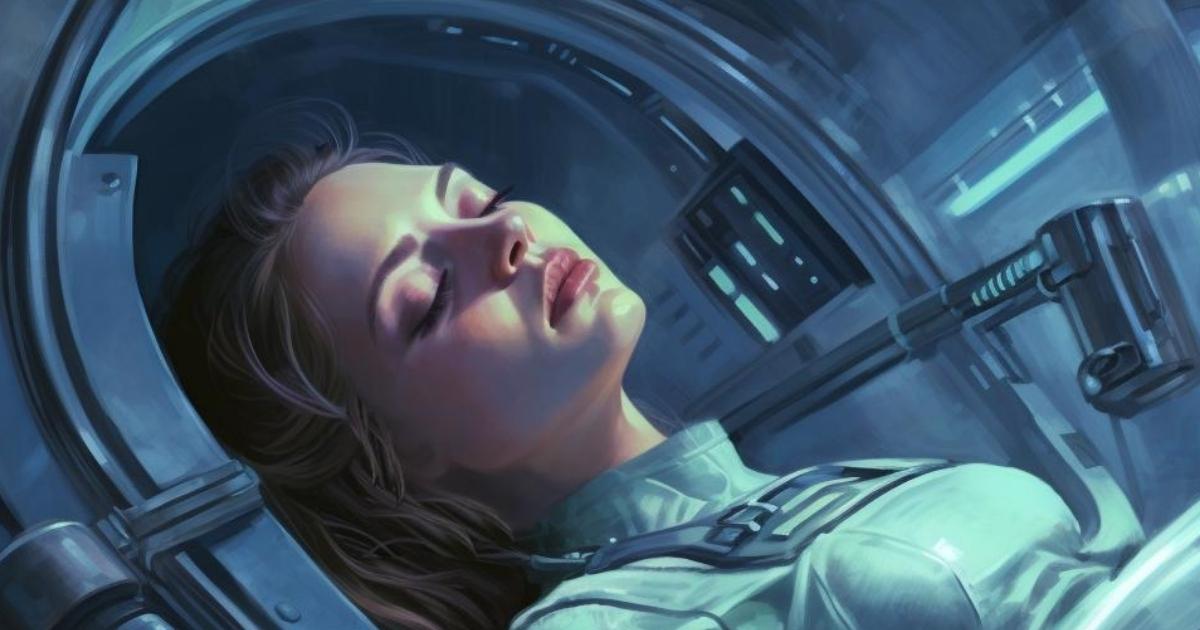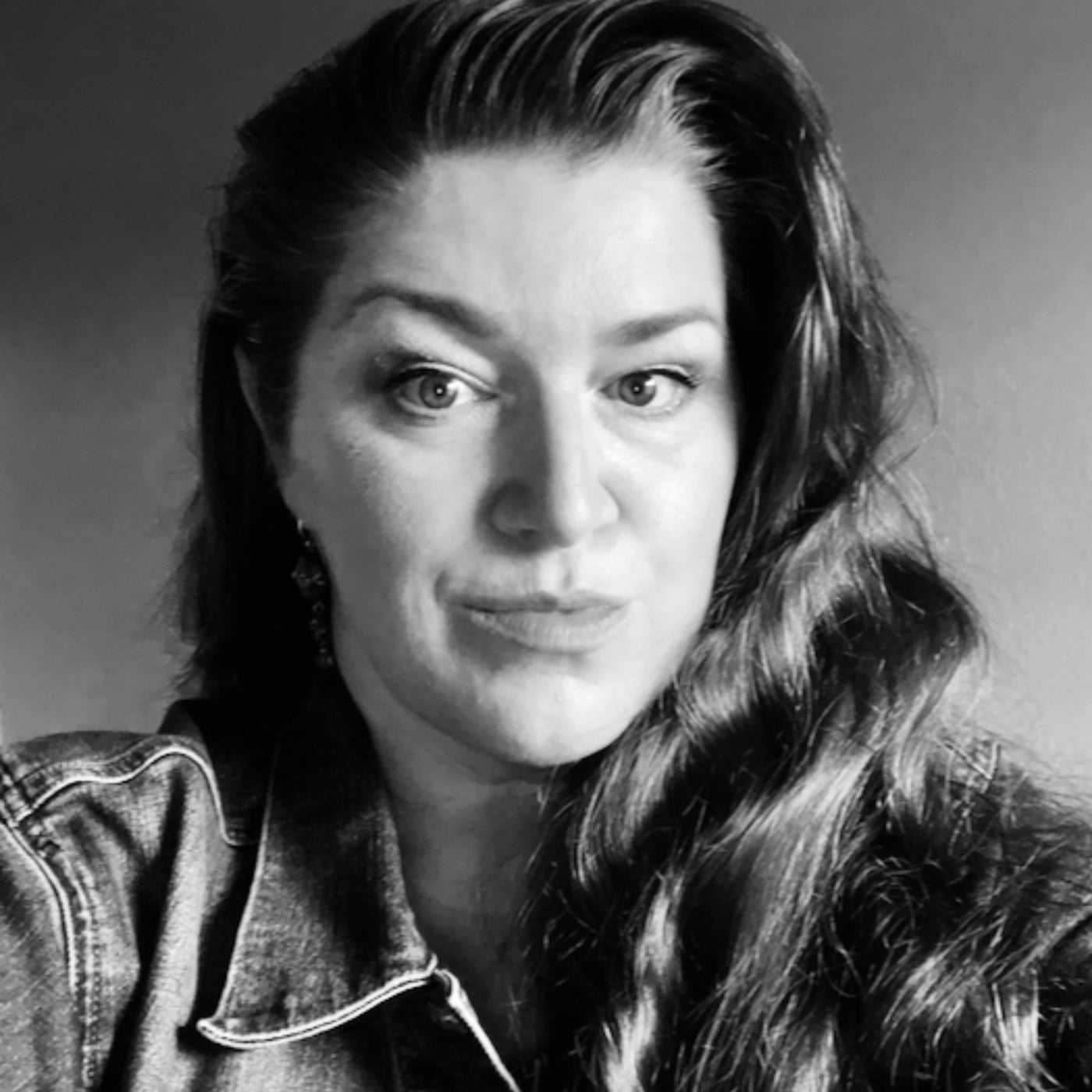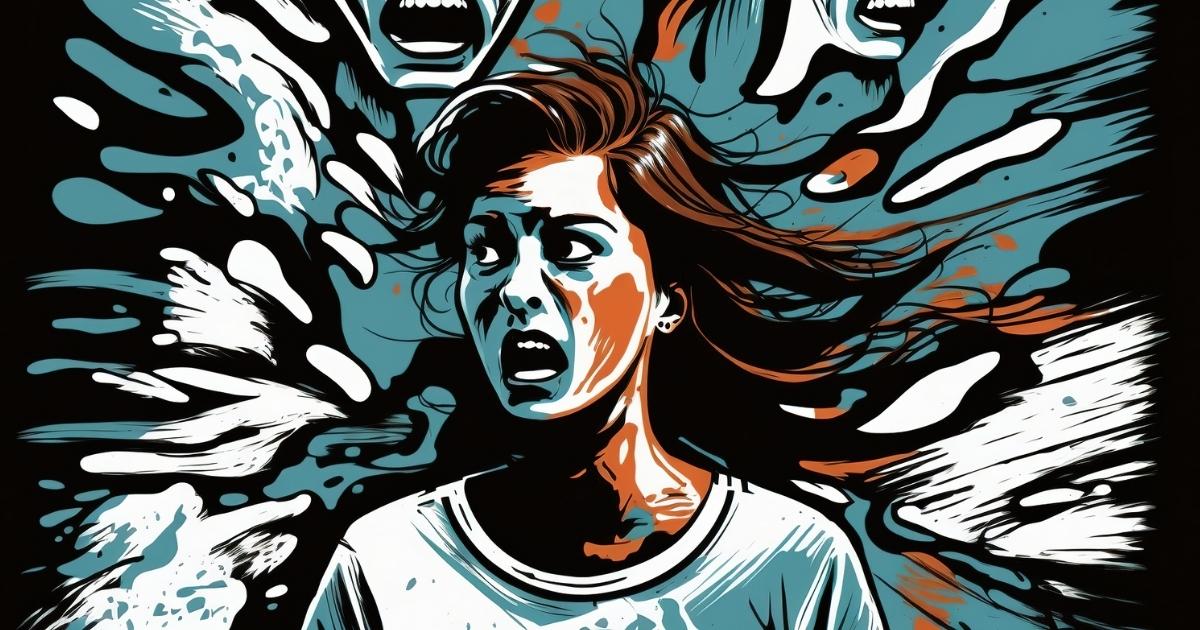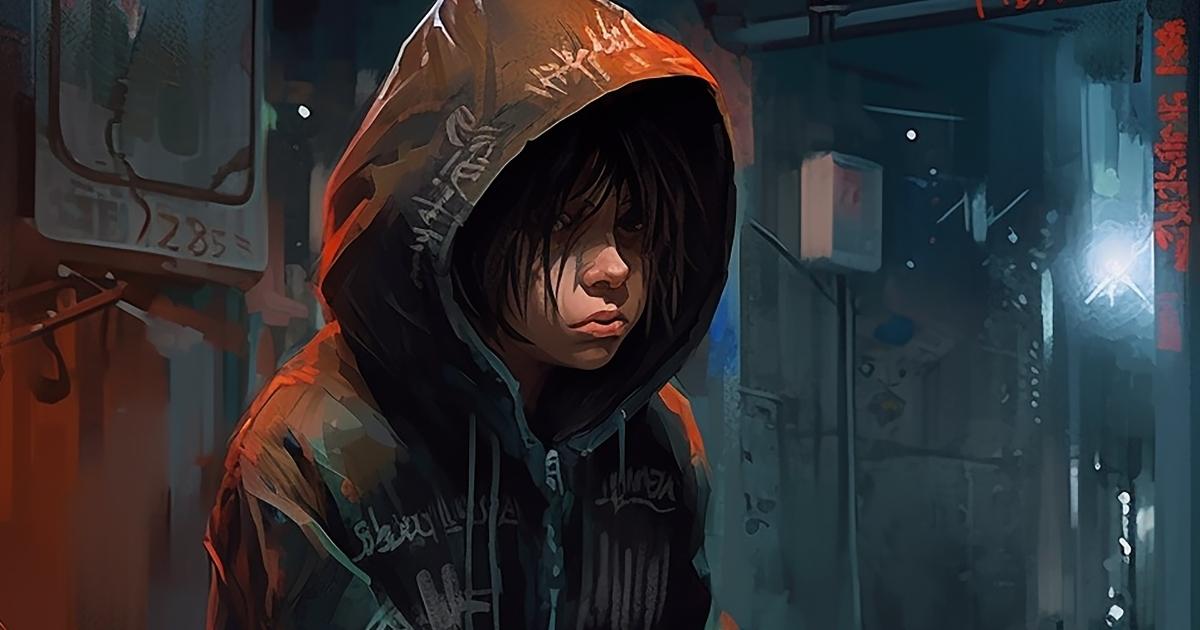

Permissions
By Christi Nogle
I suppose the girls were too sheltered. Seems strange to call it that, but what else?
When the natural boardwalk was still open, my wife and I thought we’d promenade with them all the time, but on the first trip out, our younger daughter Andie said, “Can I take this off?” We thought she meant the veils and walked her into the beachgrass away from the crowds. We all wore veils, not just the artificial children. People with flesh needed protection from the sun, and everyone was paranoid about paparazzi showing up—though that lessened over time, and we began to think we really were safe out here in the desert.
But Andie didn’t calm down when we lowered her hood around her shoulders. She said, “No, this,” hands around her face.
Our older girl Kirby said, “She means the body.”
“I can’t see,” Andie said. “Everything’s too far away.”
It was quite a slog back with Andie panicking, Kirby suggesting we simply eject them back into their wing of the bunker. And carry the heavy robot bodies home? I’d have done it, but my wife was not such a pushover.
We both felt terrible. We spent the night in the artificial wing with them, which they always loved.
I apologized, said, “I thought it would go better.” They’d been to the artificial boardwalk scores of times, after all. No doubt it was the more appealing of the two. In it, we could walk all the way to the sea, wade or swim if the mood struck us. Dine on beef and shrimp and salmon, crisp lettuce, ripe red tomatoes.
In the natural version, the sea was only a suggestion—screens, or perhaps even tinsel and mirrors along the horizon. Fake beachgrass rooted into real desert sand. Staff-less restaurants served 3D-printed dishes composed of material grown hydroponically underground. The gray and scaly Gargoyle Pies, crisp as fresh croissant; the cloying, nutty Battenburg Mushrooms; nostalgia casseroles like Vegetable Ardor and Turkey Elegance. Innovative stuff, but it never felt authentic as the virtual steak and seafood.
We’d persuaded Andie out again but never stopped to eat. How could we stuff our faces while the girls sat silent in their veils? Family visits to the natural boardwalk lost their appeal and soon ceased.
I’d hesitated to bring them into the world in the first place, after the encounter with that poor woman at the wedding. Every difficulty with them struck me hard.
When I say they were sheltered, I mean more than the veils. They were restricted, every access strictly controlled so that they did not progress too fast or beyond what a natural child would. The point was to raise them, to teach them language, read books to them, share our memories verbally rather than simply uploading this and downloading that. It felt essential to give them what we had, to make them as human as we possibly could.
So they went to school, did homework, had limits on screen time. Got in trouble, had birthdays. I’ll admit to abbreviating some of the baby stuff, but once they were conscious, we avoided manipulating time for them or even putting them into stasis.
The methods succeeded. The girls felt—they were, are—entirely real.
🎡
My wife’s niece’s wedding reception was perhaps the final significant event we attended in the flesh. I already felt some change coming. People with money were quietly buckling down.
I’m vague because it was all so vague to me. I only knew my wife’s money would last. I had no say how we spent it and so no reason to be informed.
I was young. Talented they said, but really only young, idealistic, fastidious. Before marrying, I’d worked as an AI-assisted artisan of custom biopictures, documenting people’s experiences, properties, and possessions. This hybrid art combined features from films, games, and albums. I thought of my works as vaults preserving entire lives.
I loved the work. The wealthy patrons paid plenty, and this allowed me to make pics for poor but interesting folks on the side, which made me feel noble…until I fell in love with a patron and became compromised, as we all must.
There was a maudlin feeling at the niece’s wedding, the event tighter and smaller than usual. While my wife danced with her father, I returned to my seat with a sigh. A woman I didn’t recognize was half-draped on our table, idly scrolling through pictures.
“Sleepy?” I said. I thought her drunk, but when her head raised, I saw she was doped.
“Look,” she simpered, “my children.” She pushed her phone over so I could scroll through artificial images of people who had never existed. They were living vibrant lives, anyway, visiting the Eiffel Tower and going on safari and shopping in opulent malls overseas.
When I returned the phone, she fell back to scrolling. I noticed on her free hand a bracelet of crystal charms embedded with digital images. I’d seen a few of these and never investigated, but when my wife returned, she held up the woman’s wrist for me to see. (The woman never noticed, intent as she was.) People moved in some of the crystals. In others, sports cars revved, exotic animals writhed and paced.
“My great uncle’s latest wife,” she said. “The bastard keeps her in a stupor. Virtual children, vacations, the whole bit.”
It didn’t seem the woman heard, and yet I felt uncomfortable speaking about her. I got us up again to dance.
That night, my wife told me about this place, the barest outlines of it at least. She didn’t want us to go the way of her family. She wanted to live simply, sustainably, and donate the bulk of her wealth to lost causes. She was choosing to live as honorably as she could imagine. Electricity, harvested from the killing sun itself, would provide most of what we needed in this new community.
Not long after we were buried in our bunker, she came off a call saying, “Think of it, children who live on nothing but electricity—nothing but sunshine!” And I mentioned that woman with her crystal charms. How strange I had not thought of her for all the time between.
“No, you misunderstand,” my wife said. “Real children, raised in natural time, their characteristics determined by our DNA. They develop from experiences we have with them.” She wept and went into the bathroom.
“I don’t know if I can forgive you for even suggesting it’s the same,” she said later in bed.
She forgave, she forgot. When Kirby came, and then especially with Andie, we were so busy, so giddy, that we never did much reflecting again.
🎡
The design of this place is quite thoughtful. Say my wife is sick, the children at school, but it’s a fine cool morning, and I long to get outside (exercise being so much more essential when you have no meaningful work to do). I take the elevator up to the boardwalk, look up and wave to my wife who waves back from a window in a vast wall pretending to be a building. The window she waves from is a screen, of course. The camera she waves into is far underground. It’s a lovely illusion, even more so because I see the windows of the thousand neighbors I would otherwise forget were there under the earth. I run, perhaps pick up some flaky pies.
Food piped into the bunker is of the same stuff but less fancy. We need something for a treat.
I arrive home.
The girls tell me about their day from one of the many screens pretending to be open doorways in our west wall. The south and east walls look onto beach and sea, the north wall onto trees and distant hills. These screens could show anything, but they show us nature because it helps with claustrophobia. It helps us feel we really do live at the seaside.
“Come over,” Andie might beg, so I go into the closet at the southwest corner of our dwelling, strip naked and step into the engrossing warmth of foam, step out into the girls’ virtual wing fully dressed, refreshed, as if I’ve had a good long sleep. I see my wife through a doorway, wave to her as she warms faux-cocoa in the heating unit.
I brush Andie’s hair with Kirby standing close by the vanity asking, “Why doesn’t Mother come? What’s wrong with her?”
Andie picks up the magic mirror. “Mother, Mother,” she calls. My wife’s haggard face appears from her nightstand mirror. Her voice is thick, but she asks, “How was school?” and “Why not go out for a while? It isn’t late.”
So, Andie dons a frilly dress and Kirby a chic black jumpsuit. We take their elevator out to their boardwalk—the artificial one. We’re met with the rush and scent of sea, the lighted kites flying in strong breeze. If I win a stuffed unicorn for them here, we can bring it home. We’ll eat good, clean food in the open air.
It’s magical.
Except when it’s too hot to go out in the morning, and the air quality prohibits me from going out. I’ll be free to go out running for three days in a row, but then I must stay inside for three days in a row, and so on as safety dictates. The elevator will not open without a statement of emergency on prohibited days.
Our screens show the outdoors dim, blurred, and unappealing. Perhaps this is to deter people from faking emergencies. Alerts suggest changing our window-view for the time being, to help with morale.
🎡
We said we would not, but we halted them, Kirby at thirteen, Andie at ten. We had not been prepared, after all.
I remember the hollow-eyed teacher’s call. I believe she lost her job after that call. Parent-teacher meetings had always been polite, perfunctory, but she must have reached her limit, and I must have seemed sympathetic because she went on and on, revealing more layers of frustration. My wife sat off-screen, ashamed because she did not look well.
“They’re extremely competitive and boundary-testy, as you know,” said the teacher.
“Which is not a bad thing,” I said.
“Which is not a bad thing, but I don’t think you realize the level of antagonism between them, between them and any natural children in class—though these are fewer and fewer—and with teachers as well.”
She went on to describe their horrifically long and complex essays, fascinating at first, “but you see, with thirty in a class, with six classes…I try, but it’s impossible, and all of them want detailed feedback. It’s like they’re testing my comprehension, offended or hurt when they see I
haven’t engaged. You can’t imagine.”
“Soon all the teachers will be artificial, she won’t have a job, and she won’t have a problem,” my wife said all low and angry. I couldn’t tell if the teacher heard.
The teacher was desperate for anyone to understand. She said what I knew. “They’re not allowed to realize their potential, but they feel it there. It makes them frantic.”
Her background was blurred. I imagined how poor and how dangerous her life must be, away from here. Not for the first time, I thought of everyone who had it worse than us and was ashamed.
My wife finally swept into the frame when the teacher said, “But they aren’t even real.” My wife screamed something. The teacher screamed back, “They’re monsters you’ve made. You and they are monsters.”
🎡
The natural boardwalk closed permanently. It wasn’t simply climate but also threats from the skies and from marauders nearing our boundary. Nothing had been breached and yet there was a chill to my final visits, that old paranoia returning stronger. I relied on home gym equipment from that point on, which was just as well, as I didn’t like to leave my wife’s side for long. She was having fewer good days.
We’d halted school along with the girls’ aging, so we spent much time in the bunker bickering with them.
Permissions were the constant topic. We wouldn’t let them grow older, access the wider web, or travel to the many other artificial sites available. No one in our community did that, to be fair, for the sake of safety and privacy, but the girls fought their limits as all children do.
Along with the two largely unused child bodies in the northwest closet, there was the massive worker robot we’d bought to rearrange furniture and help with any heavy task. Either of the girls could enter it, or both at once I suppose, but we’d never let them.
“May I play with the big robot?” Andie might say.
“What for?”
“Just for fun. I’ll clean the ceiling fixtures; it’s tall enough to reach.”
“You’ll break them,” I’d say, and then she’d whine, “Please,” and so on.
Another big topic was my wife. One day Kirby said, “We respect that Mother will not seek outside assistance, but we could run diagnostics and even perform simple surgery if only she’ll ensconce in the southwest closet and give permission.”
I hadn’t known that and asked, “Is my permission sufficient?”
Kirby shook her head. “If she were incapacitated, we could act on her behalf. As it is, she is competent to refuse—”
“She knows and she is refusing?”
“I am not at liberty to discuss.”
And so we went around and around, growing ever more anxious and cabin-fevered.
🎡
We quit the virtual boardwalk too, after a visit from my father-in-law. Visits were almost unheard of here, but he’d always had ways of getting whatever he wanted.
The girls held my hands tight as we waited outside the visitor portal. They’d seen him in calls, of course, but this was different. They hugged him warmly, showed emotion. He was quite affected as well. He was, all in all, a good man.
He had an aura of youth and strength that had nothing to do with the young virtual body he wore. He was sharper, wittier than he’d been twenty years before. He must have had some form of mental augmentation. Maybe he was more computer than man now.
I wanted to take him to our best restaurant, but he waved me off, saying, “I can get that sort of thing anywhere.” Instead, we toured around, sampling funnel cakes and gyros and what have you from the boardwalk stalls. An illustrated man stood before us in line for ice cream. I might not have noticed, but when the girls gasped and murmured, I caught the blue-faded tattoos moving, the mermen and dragons winking and gyrating.
“Everything is supposed to be naturalistic here, isn’t it?” my father-in-law said later while we watched the girls wade into the ocean. “If you’re seeing things like this, security has been compromised.”
A striking woman rode past on a glowing golden horse just then. I was glad the girls didn’t turn.
He said, “If it were me…well, you know how I live. But you, if you want to keep your innocence and theirs, it might be time to cut off from here, too.”
“I don’t know if I can stay,” I said. I’d not admitted it to myself until then.
“You will. You’ve always supported her, no matter what. She was always a weird girl, but I couldn’t have wished any better for her than you.”
He looked toward the window-wall and said, “You know they keep DNA and all manner of things underground? Seeds, biopictures.” With a nod toward the girls, he said. “Do you think they could remake everything, sometime in the future?”
“Why would they want to?” I said. No doubt they could immortalize us, but wouldn’t they rather do other things given their freedom, like any natural child?
I thought he would stay for the night, but my wife refused him entry to the girls’ wing. They said their goodbyes through a mirror compact he held.
In the artificial world, mirrors have always been magic.
🎡
The girls were artistic like me. They drew, painted, and sculpted expertly within their wing. Even in our wing, moving in those awkward bodies, they could make beautiful objects. They’d never been allowed to work in their own element, however. We’d never let them create new realities.
Of their many wishes, this was the one that we finally granted once both of the boardwalks were off limits.
We let them build double doors in their wing of the bunker, and behind those doors they constructed my wife’s childhood home, the very mansion of the long-ago niece’s wedding, and our own. They did not have to start from scratch. I dusted off copies of the many biopictures I’d made, promising that if this first project went well, we might do others, and then we might permit them to make up some new spaces from their imaginations.
The biopictures fascinated them. They’d never seen me as a creator before, and I basked in their respect, especially Kirby’s. It was the first time she had ever seemed impressed with me, maybe the first time she had seemed impressed with anything.
My wife had never allowed herself to look younger in a virtual space, but she did it that night when they opened the door into the mansion’s vast front hall.
“Oh, it’s perfect,” she said. She hugged the girls.
“We’ll tour with you sometime, but not tonight,” said Andie.
“Tonight’s for you two,” said her sister, closing the doors.
I couldn’t help saying, “I assisted them with final touches.”
“Oh, it’s all you, really, your documentary work,” she said. She caressed the carved banister. “I wish you’d gotten to keep doing that.”
The girls had made the upstairs rooms a little too chilly, as they’d always been in life. Once toured, we took sweaters from the closet in our guest room and cuddled under the comforters.
The feeling of intimacy, of privacy, was overwhelming. Every object was an old friend returned. I marveled at how real it all felt but did not say so again. I wanted to sink into the illusion.
My wife did too. She spoke as if it were the past, asking about a tricky pro-bono job I’d taken decades before. She worried over what would become of her reckless brother, long dead. I fell into the conversations as I surely had before. It felt wonderful and disturbing at once. As I drifted off to sleep, I wondered if we were truly in a virtual space or if we existed within a recording from the past, a moment in the biopicture.
I knew that our natural bodies hung suspended within the southwest closet. The sanitary foam would keep us clean, and if we stayed long enough, feeding tubes would sustain us as well. But I also doubted this truth more often than I’d like to admit.
Was I drifting? Was I becoming a hybrid creation like my father-in-law had become?
🎡
Morning brought bright light like we hadn’t seen since the boardwalk days. My wife was rumpled but still young. Again I wondered, Is this a recording? Is this now or then?
She broke the spell, saying, “The girls are brilliant. This is—this has been—spectacular.”
I stroked her cool hand, and a lump rose in my throat the second before she spoke again.
She said, “This is my last will and testament. I don’t want it on paper. I want it only between us. When I step back into our wing, I’m not returning here. I don’t want to be interfered with or preserved in any way. Let me go.”
“No,” I said, “We can still—”
“And while you live, keep the girls protected. I wanted to tell you what to do about them after that, but it isn’t my choice. It’s yours. They were always so much more real to you than they were to me. I could never quite…suspend my disbelief.”
I hated her for a second, but let it pass.
“The electricity will last a long time here, but not forever. They could go free on the web—I guess that’s what you’ll want. I can’t guarantee they won’t be hurt, and I’m not sure they would stay themselves, but if you keep them here as long as you can, maybe they’ll have a better chance when they do go. Or you can cut the cords and bury them, or even just tell them to sleep forever.”
We talked after that, but not for long. It was not long before she started to lose her train of thought.
🎡
Back in our wing, I held her in blankets. I rocked her.
She froze the girls first thing so they could not interfere and prohibited me from waking them until it was done.
I was too weak to do it all myself, and so in a fever, I entered the southwest closet again and swept past the girls, motionless at their work table. This is hell, this is hell, I thought.
I moved through their wing to the control panel, which opened to me fully as it never had for them. I typed in my password and commands, closed my artificial eyes, and opened them to the doors of the northwest closet. I was within the hulk now, sufficient to hold her, to rock her like a baby, move her in bed, move her to and from the toilet.
I sang to her in my echoey robot voice as the painkillers piped into her. When it was all over, I opened the southwest closet and held her upright until the foam took her from me, and then I closed those doors and made my way back through the steps until my own body woke again and backed out of the closet.
The image of holding her body in the foam, shoulder to shoulder with my own living body—I will never forget it. It’s something no one should see.
There had been no time to think. Days or weeks, I didn’t know. It had been only the next thing and the next, and now the next thing was this: Decide. What to do about me, what to do about the girls.
Whatever it was, I would wake them first.
No, first I would go to the control panel, enter my password once more, and remove every restriction. Move every No to Yes.
A shiver came through me—perhaps they were not what I thought, not kind. Monsters, after all. I hoped that was true. I hoped they would burn something glorious.
Copyright © 2023 Christi Nogle
The Author

Christi Nogle



